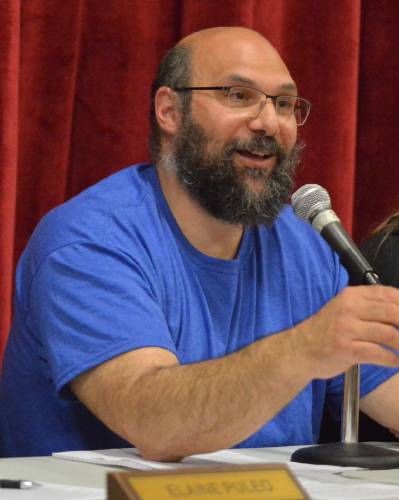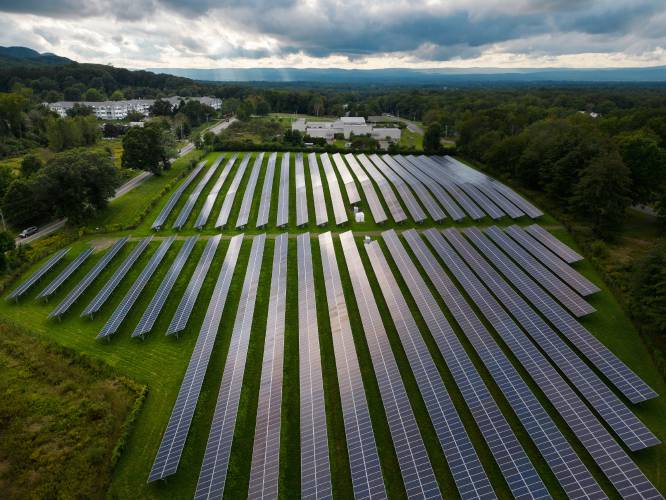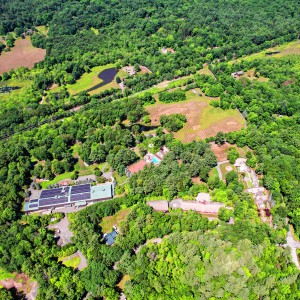State climate law leaves locals uneasy
|
Published: 12-06-2024 7:20 PM
Modified: 12-07-2024 9:44 AM |
With the new climate and clean energy law changing the permitting process for solar and battery storage projects, western Massachusetts residents are left wondering how the regulations will impact their rural communities.
“An act promoting a clean energy grid, advancing equity and protecting ratepayers,” signed into law by Gov. Maura Healey in mid-November, aims to create more jobs in the energy sector, expand protections for businesses, lower energy prices for residents, and expand electric vehicle accessibility and clean heating options. It also aims to standardize the permit process, giving the Energy Facilities Siting Board jurisdiction over battery storage projects of 100 megawatts or larger. This is where those in rural communities feel steamrollered by the law.
No Assault & Batteries, a local citizens’ committee that formed in opposition to a 105-megawatt battery storage facility that had been proposed in Wendell, is holding a forum on Tuesday, Dec. 10, to discuss the impact of the law. The forum will be held from 6 to 8 p.m. on Zoom.
“The point is so we can educate ourselves, and hopefully some of the other rural communities in western Massachusetts, to understand there are alternatives [that] do the job smarter and better,” said Wendell resident Court Dorsey, a member of No Assault & Batteries. “Leave the control, the power and the benefits of the systems in the communities that employ them.”
Michael DeChiara, chair of Shutesbury’s Energy and Climate Action Committee and a member of the Shutesbury Planning Board, and Paul Fenn, founder and president of Williamsburg-based Local Power LLC, will speak at Tuesday’s event.
Under the new law, the process to build solar and battery storage facilities will put small-scale projects under a single permit to be overseen by cities and towns, while large-scale projects will have to go through an application to the Energy Facilities Siting Board for approval.
Fenn said cities and towns that are worried about losing control over energy projects should consider building their own. Rather than wait for a developer to swoop in, municipalities can build their own energy facilities, which would allow them to control size, location, how green it is and ensure it benefits the community, rather than harms it.
“Our main message is Mass law makes it possible for towns to build their own renewable energy,” Fenn said ahead of Tuesday’s forum. “When aggregations buy power, they’re not really buying green power, they’re buying normal power and pieces of paper with green credits. Instead of buying it, towns could build their own power.”
Article continues after...
Yesterday's Most Read Articles
Legislative officials understand residents’ concerns about losing local control over large-scale projects.
“I am worried. I share the concern of communities that are worried about an erosion of their ability to govern themselves,” said Sen. Jo Comerford, D-Northampton. “A lot of my work was about trying to shape and right-size the bill so community concerns were really centered, and we tried to work through them at the Senate.”
The law factors in recommendations from the Commission on Energy Infrastructure Siting and Permitting. Its provisions are intended to help move the state closer to its goal of net-zero emissions by 2050.
The Senate in June and the House in July passed their own climate bills, but Democrats were unable to reach a compromise by the end of formal sessions on July 31. Sen. Michael Barrett and Rep. Jeff Roy continued negotiations into the fall, even after Healey tried to get the siting and permitting language alone passed as part of a budget bill.
The final bill passed in the Senate on Oct. 24 and the House on Nov. 14, and was signed into law by Healey.
Undersecretary of Energy Mike Judge, who was on the Commission on Energy Infrastructure Siting and Permitting, said the permit application is standardizing the process.
“We have a lot of work to do to meet our clean energy [and] climate objectives and requirements, and that’s going to require that we cannot have situations where projects take five to 10 years to permit,” Judge said. “We’re trying to implement process efficiencies here, while retaining as much local control over the permitting process as possible and make sure that communities have opportunities to engage and provide input in siting decisions.”
Also with an eye toward increasing efficiency, the law requires all municipalities to approve small clean energy infrastructure project applications within 12 months through a mandated consolidated permitting process. If a city or town does not act within the time frame, the permit would be automatically approved.
According to DeChiara, right now every municipality has a different application to get a permit.
The provisions of the law do not take effect until March 2026, allowing time to establish regulations to interpret the law. For example, Judge said a uniform set of public health, safety and environmental standards still needs to be developed.
“We’re up against the clock and we do have a lot of work to do,” Judge said.
However, this limbo period has left many in western Massachusetts feeling unsure and uneasy.
“It will change the dynamics in 15 months, but not now, and projects are getting developed now,” DeChiara said. “People are confused.”
Comerford said that “policy is never really done” and she’s talking with concerned residents “all the time” about how to improve communication with municipalities.
“We’re going to host a forum for our municipalities, so they could go face-to-face with the people who are doing the implementation,” she said.
Climate activists said the disconnect between them and those in favor of the law comes from outreach.
“For folks who are in the eastern part of the state, maybe [they] prefer big lights, lots of action, a lot of electricity use, and then put their generating and storage facilities in biodiverse regions where they’re not warranted,” Dorsey said. “To say that the people who live there and who have moved there in order to steward that land have no say in the matter is beyond arrogant and certainly not democratic.”
Judge said the commission heard from municipalities throughout the process that it was really important f or them to be very involved.
“That was definitely very central to the work of the commission,” Judge said, “making sure that communities feel as though their voice is heard and that they have a say in how these products are cited.”
Those who would like to attend Tuesday’s Zoom forum sponsored by No Assault & Batteries can RSVP by emailing csqueen@outlook.com. The Zoom forum can be accessed at tinyurl.com/CleanEnergyLawZoom (Meeting ID: 839 0679 6886; Passcode: 339921).
Mara Mellits writes for the Greenfield Recorder through the Boston University Statehouse Program. Staff writer Madison Schofield contributed reporting and information from State House News Service was used in this report.








 ‘It’s a Wonderful Night in Turners Falls’ showcases village businesses, nonprofits
‘It’s a Wonderful Night in Turners Falls’ showcases village businesses, nonprofits Sackrey Construction Co. of Sunderland celebrating 35 years in business
Sackrey Construction Co. of Sunderland celebrating 35 years in business Photo: As darkness falls
Photo: As darkness falls Leverett residents rap Kittredge compound plans, urge caution as negotiations for 400 homes move forward
Leverett residents rap Kittredge compound plans, urge caution as negotiations for 400 homes move forward 
